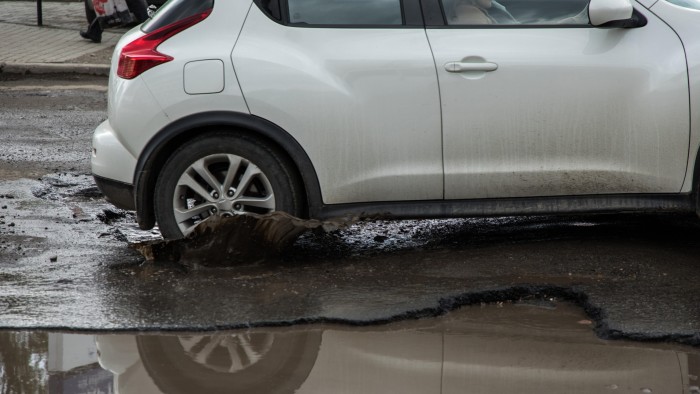Unlock the Editor’s Digest for free
Roula Khalaf, Editor of the FT, selects her favourite stories in this weekly newsletter.
England’s roads are a “national embarrassment,” an influential group of MPs has warned.
The road network is blighted by potholes, while councils do not have the data to fix them, leading to disrupted journeys that ultimately harm the economy and inconvenience motorists, the Public Accounts Committee said on Friday.
“The declining state of England’s local roads is a national embarrassment,” said chair of the committee, Sir Geoffrey Clifton-Brown.
“As well as harming the prospects for our economy and communities’ own social wellbeing, highways riddled with potholes pose an increasing safety threat to road users,” the MP added.
The report said local road conditions were “on the downslope” and that the Department for Transport had not taken its responsibilities and the use of taxpayer funds “sufficiently seriously”.
The committee said the department had insufficient knowledge of the state of the roads, reflected falling public satisfaction and growing numbers of pothole-related incidents.
The Asphalt Industry Alliance (AIA), which works to increase investment in highway infrastructure, estimated in 2023-24 that just under half of UK roads were in a “good” structural condition, the report stated.
The department admitted to the committee there were problems with its data collection. For example, information on unclassified roads only gathered from local authorities on a voluntary four-yearly basis, despite accounting for 62 per cent of mileage on local highways.
“Our inquiry shows government are having to find out about these issues from industry bodies and road users themselves due to their own patchy data,” the committee said.
Since 2020-21, the department has provided local authorities with funding from the Potholes Fund — one of twelve funds allocated to local authorities for maintenance — which is expected to total £2.2bn by the end of 2024-25.
Alongside a one-off top-up in 2023-24, specific pothole funding from the department represented 40 per cent of capital funding to local authorities in that year.
An additional £500mn for road maintenance, aiming to fix a further one million pot holes across England was announced in the autumn Budget.
According to the Road Haulage Association, planned works cost an average of 35 per cent less than reactive repairs in England, the report said.
The RHA added that short-term maintenance, including temporarily fixing potholes, had caused money to be “wasted”.
The report found there were also continuing problems with infrastructure projects, reporting an increase in delays as well as falling out of the scope of their budgets.
The Department for Transport said: “For far too long our roads have been left to crumble, and this report has laid bare the result of the decades of decline we have inherited in our road infrastructure.
“That’s why we’re investing a record £1.6 billion for the coming year to help local authorities fix up to seven million more potholes.
“Road users are rightly frustrated by patchwork repairs, so we are also committed to multiyear funding settlements to enable councils to better maintain their road networks and avoid potholes forming in the first place.”
Adam Hug from the Local Government Association said: “Greater, long-term funding certainty for local highways authorities — with five yearly funding allocations on a par with national highways — is needed to tackle the multibillion pound local roads backlog.”
“This will enable councils to far more effectively plan for and invest in preventive treatments, which keep surfaces in better condition for longer.
The MPs’ report came the day after new figures showed that only a small fraction of the UK’s national infrastructure projects are on time and within budget.
The Infrastructure Projects Authority, which oversees the progress of major schemes for the government, said on Thursday that the number of projects rated “red” for risk in 2023-24 had increased.
Only 25 green-rated projects, or just over one in ten, were deemed “highly likely” to be delivered on time and on budget.
It said that successful delivery currently “appears to be unachievable” for £97bn of major schemes, many of them IT projects and key defence programmes such as the replacement of the Typhoon fighter jet.
Three immigration projects were also rated red, including the rebuilding of the Manston detention centre and the creation of a new end-to-end immigration system, as well as the remaining phase of HS2.



